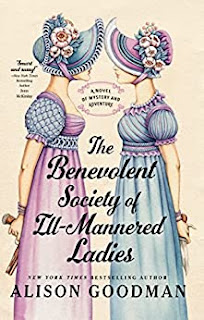A
high society amateur detective at the heart of Regency London uses her wits and
invisibility as an ‘old maid’ to protect other women in a new and fiercely
feminist historical mystery series from New York Times bestselling author
Alison Goodman.
Lady Augusta Colebrook, “Gus,” is determinedly unmarried, bored by society
life, and tired of being dismissed at the age of forty-two. She and her twin
sister, Julia, who is grieving her dead betrothed, need a distraction. One soon
presents itself: to rescue their friend’s goddaughter, Caroline, from her
violent husband.
The sisters set out to Caroline’s country estate with a plan, but their
carriage is accosted by a highwayman. In the scuffle, Gus accidentally shoots
and injures the ruffian, only to discover he is Lord Evan Belford, an
acquaintance from their past who was charged with murder and exiled to
Australia twenty years ago. What follows is a high adventure full of
danger, clever improvisation, heart-racing near misses, and a little help from
a revived and rather charming Lord Evan.
Back in London, Gus can’t stop thinking about her unlikely (not to mention
handsome) comrade-in-arms. She is convinced Lord Evan was falsely accused of
murder, and she is going to prove it. She persuades Julia to join her in a
quest to help Lord Evan, and others in need—society be damned! And so begins
the beguiling secret life and adventures of the Colebrook twins.
Alison Goodman has created main characters who are progressive and easily championed. The Benevolent Society of Ill-Mannered Ladies is, I hope, the first book in a series in which the ill-mannered ladies take on the wickedness of their time, 1812. It is set in England. They take on three “cases.” Unfortunately, blackmail, murder, slavery, and human trafficking seem to be never-ending injustices. Gus and non-identical twin sister, Julia, are very different people, but they have complementary skills and seek justice in their society.
Please welcome Alison Goodman to WWK. E. B. Davis
You write in a variety of genres. Why historical mystery?
As you say, I have written in a number of genres, namely science fiction, contemporary crime, high fantasy, historical fantasy and now historical mystery/adventure. I go where the story and the characters take me and where I find a challenge, whether it be in the way a story is structured, the style, the way I use the genre conventions or the research required. This time, with The Benevolent Society of Ill-Mannered Ladies, I have challenged myself in the way the novel is structured – three novellas that are linked with an overarching storyline—and the mystery and adventure genre conventions which have been great fun to play with and twist around for maximum delight.
Are you a historian? You must have done a lot of research. The language you use is almost foreign.
I am not trained as a historian, but I have just received my doctorate in Creative Writing and Historical Fiction Research, so in a way I do have some expertise. I would probably describe myself more as an enthusiastic history nerd. I initially spent eight months researching the Regency era for my novels, and I am still researching it as I write. Frankly I love the early 1800’s and could talk about the Regency non-stop. My husband has now restricted me to only three Regency facts a day for his own sanity.
Julia is five foot, two inches tall. Augusta (Gus) is five foot, nine. Their physical differences seem to mirror their different interior landscapes, and yet, at times, Julia is bolder than Gus. What accounts for Julia’s nonconformity when she is more conventional than Gus?
You are right, Julia is more conventional than Gus and seeks a quieter life. However, if her twin sister is ever in trouble, then Julia’s other side comes out—her courage and boldness––and she will fly to the defense of her sister. Nothing can stand in her way. For Julia, family is everything.
With their father dying in a most compromising and undesirable way, their brother Duffy is head of house, although luckily, they live in different houses. Duffy pronounces that a woman’s piety equals her femininity. What do the sisters think of that pronouncement?
Gus, who is struggling with the loss of her faith, finds her brother fairly hard to take at the best of times, but particularly when he pontificates about the place of women and how she and Julia should conduct their lives. Julia is more or less the middle child—the second twin--and so is the peacemaker between Gus and their younger brother. Julia is very firm in her faith and respects her brother more than Gus does, but even she thinks Duffy’s pronouncement is a bit dubious.
And yet, Duffy isn’t dumb. He proposes marriage to a woman who will inherit a considerable fortune. Why does fiancé Harriet Woolcroft take against the sisters?
For Harriet, her impending marriage to Duffy is all about achieving rank and status. She is enjoying the fact that on her marriage she will outrank Gus and Julia. However, she is also very aware that she is the daughter of a baronet—a much lower rank than Gus and Julia, who are daughters of an Earl—and so she is seeking to quickly and firmly assert herself as the new, highest-ranked female in the family. Although the match between Duffy and Harriet is clearly not a love match, she is aware that her betrothed constantly clashes with his sister Gus, and so she takes his side and in doing so, alienates Julia too.
Julia has a lump in her breast. Did the medical community know about cancer? Were they experimenting with surgery?
Yes, the medical community did know about cancer and, in fact, one of the first mastectomy operations was performed on the famous author Fanny Burney in Paris in 1811. She wrote an extraordinary description of the procedure in a letter to her sister-in-law which still holds enormous power today. I like to incorporate real historical people into my novels and Fanny Burney makes a cameo appearance in The Benevolent Society of Ill-Mannered Ladies.
Was there an assassination of a Prime Minister in 1812?
Yes, the British Prime Minister Lord Spencer Perceval was assassinated in May 1812 in the lobby of the House of Commons. As Perceval entered the lobby, a man shot him fatally in the chest but did not flee the scene and so was immediately arrested. The killer was a merchant by the name of John Bellingham who believed he had been unjustly imprisoned in Russia and was entitled to compensation from the government but was aggrieved because all of his requests had been rejected. Bellingham was tried and hanged within the same month as the assassination – swift justice, indeed.
Who was Prior? Was he an early watchmaker?
Yes, George Prior was a British watch and clock maker. In the novel, Gus has one of Prior’s beautiful fob watches, a treasured gift from her father.
Although divorce wasn’t unheard of, it took an actual Act of Parliament to get a divorce and considerable social and financial losses to obtain. Really?
Yes, really. Divorce was prohibitively expensive and required an Act of Parliament, which meant it was really only available to the very wealthy or titled. It was also socially unacceptable and would drastically affect the social standing of both parties to the point of being ostracized by respectable society.
Is butler, Weatherly, black? He was abducted as a child and lived as a slave until he was freed and came to work for the sisters’ father. Although he is in their employ, does Weatherly see himself as an alpha male, even though he was a slave?
Yes, Weatherly is black and a freed man. The concept of the alpha male is very recent so I doubt Weatherly would see himself in that light. However, he does have a very solid sense of who he is and a great deal of justified confidence in his ability to deal with any situation.
Who was Equiano?
Olaudah Equiano was a writer and leading anti-slavery activist (an abolitionist) in the mid-1700’s who was enslaved as a child in Africa, sold twice and finally purchased his freedom as a young man. He wrote a famous autobiography about his experiences titled The Interesting Narrative of the Life of Olaudah Equiano which was a bestseller during his lifetime and helped secure the British Slave Trade Act.
When was the Slave Trade Act passed? How was it limited?
The Slave Trade Act was passed in 1807. It prohibited the slave trade in the British Empire but did not abolish the practice of slavery.
What is:
On-dit: a scandal.
Belcher neckerchief: a scarf/handkerchief that Regency men, often of the lower ranks, tied around their necks instead of a cravat.
Debrett’s: a guide to the British aristocracy.
Foxed: drunk
Dimity: a cotton fabric used in ladies wear.
Abigail: a lady’s maid.
Bon ton: good society or high society.
Jean (not the same as our jeans): a hard-wearing cotton material that was often used to make half boots.
What was the window tax about?
The window tax was literally a tax on the number of windows in a house. It resulted in landlords boarding up windows to avoid the tax and therefore cutting down on ventilation and light which created health problems and aggravated epidemics.
Why were dance floors chalked?
The dance floors were chalked—often in beautiful designs––so that the surface was not too slippery for the dancers. Shoes at the time were handmade with leather soles which had no grip.
Why did the maids have men’s names?
A lady’s maid was considered a senior servant and so would be called by her surname such as Julia’s lady’s maid who is called by her surname, Leonard. The use of a surname was a mark of higher rank within the servant hierarchy. House maids and kitchen maids were of lower rank and so would be called by their first name.
What is next for Gus, Julia, Evan, and Weatherly?
The Ill-Mannered Ladies, Evan, and Weatherly are all coming back for another set of adventures. I am in the final stages of writing Book 2, and I’m having just as much fun writing it as I did The Benevolent Society of Ill-Mannered Ladies. I can’t say too much, but be prepared for resurrectionists, Georgian sex clubs, and spies!

















